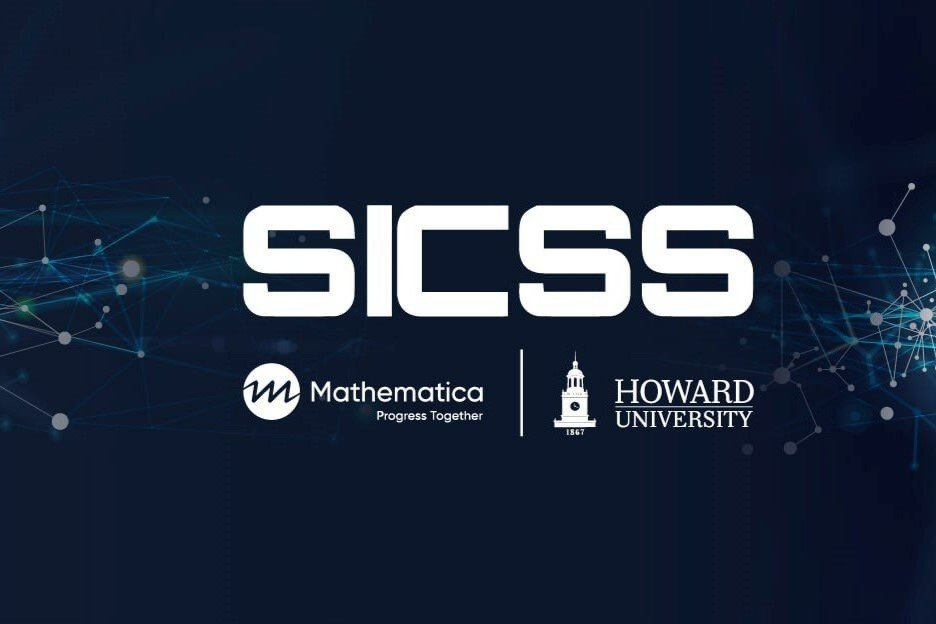SICSS-Howard/Mathematica Alumni Receive 2023 Excellence in Computational Social Science Research Awards
This blog post is the eighth, and final, post in a follow-on to our 2021 “The future of computational social science is Black” series, about a Summer Institute in Computational Social Science organized by Howard University and Mathematica. It continues to bring the power of computational social science to the issues of systemic racism and inequality in America. This marks the third iteration of the successful SICSS model being hosted by a Historically Black College or University.
SICSS-Howard/Mathematica’s 2023 Annual New Frontiers in Research and Technology Panel focuses on “AI + Automation + Work”
This blog is the seventh, and penultimate post, in a follow-on to our 2021 “The future of computational social science is Black” series, about a Summer Institute in Computational Social Science organized by Howard University and Mathematica. It continues to bring the power of computational social science to the issues of systemic racism and inequality in America. This marks the third iteration of the successful SICSS model being hosted by a Historically Black College or University.
Latanya Sweeney, Harvard Professor and Founder of the Public Interest Technology Lab, Delivers Keynote Address at SICSS-Howard/Mathematica 2023
This blog post is the sixth of eight in a follow-on to our 2021 “The future of computational social science is Black” series, about a Summer Institute in Computational Social Science organized by Howard University and Mathematica. It continues to bring the power of computational social science to the issues of systemic racism and inequality in America. This marks the third iteration of the successful SICSS model being hosted by a Historically Black College or University.
Latanya Sweeney, scholar of technology science, Daniel Paul Professor of the Practice of Government and Technology at the Harvard Kennedy School and in the Harvard Faculty of Arts and Sciences, and director and founder of the Public Interest Tech Lab, delivered the keynote address for SICSS-Howard/Mathematica 2023.
Exploring Innovations in Computational Social Science: Highlights from SICSS-H/M's Bite-Sized Lunchtime Talks 2023
This blog post is the fifth of eight in a follow-on to our 2021 “The future of computational social science is Black” series, about a Summer Institute in Computational Social Science organized by Howard University and Mathematica. It continues to bring the power of computational social science to the issues of systemic racism and inequality in America. This marks the third iteration of the successful SICSS model being hosted by a Historically Black College or University.
Insights and Inspirations from Leading Scholars for Future Computational Social Scientists
This blog post is the fourth of eight in a follow-on to our 2021 “The future of computational social science is Black” series, about a Summer Institute in Computational Social Science organized by Howard University and Mathematica. It continues to bring the power of computational social science to the issues of systemic racism and inequality in America. This marks the third iteration of the successful SICSS model being hosted by a Historically Black College or University.
The Beauty in Nurturing Communal and Liberating Forms of Computational Social Science
This blog post is the third of eight in a follow-on to our 2021 “The future of computational social science is Black” series, about a Summer Institute in Computational Social Science organized by Howard University and Mathematica. It continues to bring the power of computational social science to the issues of systemic racism and inequality in America. This marks the third iteration of the successful SICSS model being hosted by a Historically Black College or University.
Rethinking Inclusivity in Computational Social Science
This blog post is the second of eight in a follow-on to our 2021 “The future of computational social science is Black” series, about a Summer Institute in Computational Social Science organized by Howard University and Mathematica. It continues to bring the power of computational social science to the issues of systemic racism and inequality in America. This marks the third iteration of the successful SICSS model being hosted by a Historically Black College or University.
Leveraging Data Science to Address Important Questions
This blog post is the first of eight in a follow-on to our “The future of computational social science is Black” series, about a Summer Institute in Computational Social Science organized by Howard University and Mathematica. It continues to bring the power of computational social science to the issues of systemic racism and inequality in America. This marks the third iteration of the successful SICSS model being hosted by a Historically Black College or University.
Two Perspectives on Critical Thinking and Research
Tom Chatfield and Janet Salmons discuss critical and creative thinking in this updated post from the archives. Both kinds of thinking are crucial for research, especially when the study uses new methods.
Emotion and reason in political language
In the day-to-day of political communication, politicians constantly decide how to amplify or constrain emotional expression, in service of signalling policy priorities or persuading colleagues and voters. We propose a new method for quantifying emotionality in politics using the transcribed text of politicians’ speeches. This new approach, described in more detail below, uses computational linguistics tools and can be validated against human judgments of emotionality.



